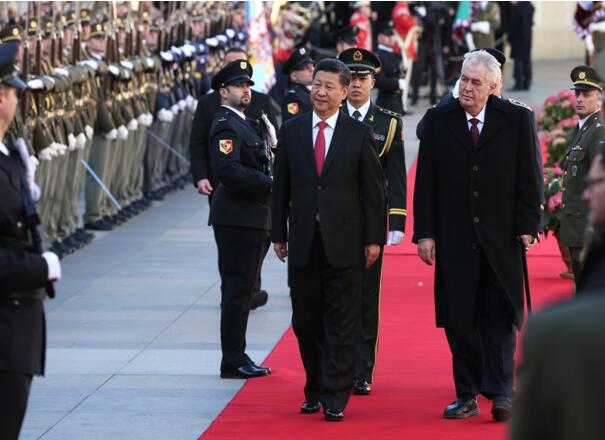Xi visits Czech Republic, attends nuclear security summit
 0 Comment(s)
0 Comment(s) Print
Print E-mail China.org.cn, April 28, 2016
E-mail China.org.cn, April 28, 2016
President Xi Jinping’s recent state visit to the Czech Republic and attendance of the fourth Nuclear Security Summit (NSS) in Washington have highlighted China’s continued efforts to promote mutually beneficial cooperation and reaffirmed China's firm commitment to safeguarding global nuclear security.
 |
|
Chinese President Xi Jinping (L, front) attends a welcoming ceremony held by Czech President Milos Zeman in Prague, the Czech Republic, March 29, 2016. |
3-day historic visit to the Czech Republic
The visit to the Czech Republic from March 28 to March 30, by General Secretary Xi Jinping of the Central Committee of the Communist Party of China (CPC), also Chinese president, is the first state visit by a Chinese president since the two countries established diplomatic ties 67 years ago, and also Xi's first state visit to a Central and Eastern European country (CEE country) since he took office in 2013.
During his visit, Xi met with his Czech counterpart Milos Zeman and both sides agreed to lift their ties to a strategic partnership as the two countries inked a host of intergovernmental agreements to promote ties in various areas.
The two presidents agreed to enhance productivity cooperation in manufacturing industry such as machinery, automobile and aviation, deepen cooperation in such fields as finance, nuclear energy, traditional Chinese medicine, air transportation and industrial park to establish all-dimensional connectivity, and push forward innovation cooperation in emerging fields such as e-commerce, communication, artificial intelligence industry, nanotechnology and environment protection, in order to forge new development points for bilateral economic and trade cooperation.
The two sides also agreed to broaden people-to-people and cultural exchange in various fields.
A ministerial or vice-ministerial level cooperation committee will be set up, and meetings of the committee will be held in China and the Czech Republic in turns to map out the future development of the bilateral ties.
The Czech Republic was the first CEE country to sign a memorandum of understanding with China concerning the “Belt and Road” initiative.
Jan Kohout, an adviser to President Zeman, said the initiative will bring about prosperity along the routes. It is not only about business but also about bringing people closer.
Xi’s visit comes amid a broader push to deepen China’s relations with the CEE countries. Working under the China-CEE “16+1"mechanism of cooperation, China and the CEE countries have held an annual summit in turns since 2012. The CEE is an essential component of China's “Belt and Road” initiative, as a quarter of the countries along the routes are located within it.
President Zeman said the Czech Republic is committed to becoming a gateway for China to Europe and becoming a hub of transportation, logistics and financial systems in China-EU trade. "We are very proud of our economic and trade achievements with China," Zeman said.
At present, China is the largest trading partner of the Czech Republic outside the EU, while the Czech Republic is China's second-largest trading partner in the CEE. Bilateral trade topped US$11 billion last year.
Xi's proposals show resolve in nuclear security
President Xi attended the fourth Nuclear Security Summit (NSS) in Washington D.C., the United States on April 1. Xi's attendance shows that China attaches great importance to nuclear security, reflecting China's willingness to promote global security governance, said Wang Yi, the Chinese foreign minister.
During this summit, Xi put forward a five-point proposal to promote international cooperation in nuclear security – the building of a network for capacity building on nuclear security, supporting all countries in minimizing the use of the highly enriched uranium according to their needs, promoting its national security monitoring system for nuclear power and helping others enhance their capacity in security monitoring and contribute its share to enhancing nuclear power safety and security worldwide.
Xi’s proposals have won support from the participating countries and were adopted into the joint communiqué issued at the end of the summit, said Wang.
As a major power possessing nuclear technology, China highlights its efforts to prioritize security. "China's nuclear industry keeps a sound record in security. No nuclear materials have yet been missing or stolen," Liu Yongde, a spokesperson for the China Atomic Energy Authority (CAEA), said in a recent interview with China Environment News.
Currently, China has 24 nuclear power generating units under construction, accounting for 40 percent of the world's total. China is also trying to explore the international market, inking deals with Britain, Pakistan, the Czech Republic and other countries.
"China applies the most stringent security monitoring to ensure the safety and security of nuclear power stations within China and those exported to other parts of the world. Nothing is left to chance," Xi said.
Before the summit, Xi met with U.S. President Barack Obama in Washington D.C. on the sidelines of the fourth NSS, and both sides released a joint statement, pledging to continue cooperation in global nuclear security.
Nuclear security cooperation has become a bright spot in the building of a new type of major-country relations between the world's largest developing and developed countries. China and the U.S. jointly established the Center of Excellence on Nuclear Security (CENS); it has been completed a year ahead of schedule and was put into operation in Beijing. According to Xu Dazhe, head of the CAEA, the CENS is both the largest project in China-U.S. nuclear security cooperation, and the largest facility for exchange and personnel training in this field in the Asia-Pacific region.
Additionally, the two countries have cooperated in other nuclear security areas such as low-enriched reactors, the security of radioactive sources, and radiation detection at customs.
Page Stoutland, vice president of Scientific and Technical Affairs at the Nuclear Threat Initiative (NTI), a nonprofit organization based in Washington, commented that China is increasingly seen as a responsible player in the global nuclear system.






Go to Forum >>0 Comment(s)